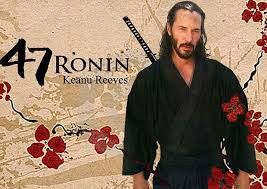Narrator: Ancient feudal Japan, a land shrouded in mystery, forbidden to foreigners. A group of magical islands home to witches and demons. A nation of rival provinces whose lords were ruled by a shogun whose will is absolute. Peace in the realm is kept by the samurai, master swordsmen tasked with protecting their lord and their province at all costs. Should a samurai ever lose of fail his master, he suffers the greatest shame in all Japanese society. He becomes a ronin. And yet, to know they story of the 47 Ronin, is to know the story of all Japan.
 Take a story that is called Japan's national legend, add a first time director, add an American movie star, add fantasy, add sorcery and witches and add a love story and what do you get? A movie that is the all time biggest money loser (almost 150 million). Take a story that is called Japan's national legend, add a first time director, add an American movie star, add fantasy, add sorcery and witches and add a love story and what do you get? A movie that is the all time biggest money loser (almost 150 million).
The movie, on its own, would not be so bad. As a samurai, fantasy movie starring Keanu Reeves it wouldn't have been that bad. It made a mistake in trying to add all these elements in to what was already a great story. Why ruin it by adding all these fantasy and fictional elements? The story that they came up with could only be a pale imitation of the fascinating original story.
Wikipedia says of the real story:
The story tells of a group of samurai who were left leaderless (becoming ronin) after their daimyo (feudal lord) Asano Naganori was compelled to commit seppuku (ritual suicide) for assaulting a court official named Kira Yoshinaka, whose title was Kōzuke no suke. The ronin avenged their master's honor by killing Kira, after waiting and planning for a year. In turn, the ronin were themselves obliged to commit seppuku for committing the crime of murder. This true story was popularized in Japanese culture as emblematic of the loyalty, sacrifice, persistence, and honor that people should preserve in their daily lives. The popularity of the tale grew during the Meiji era of Japanese history, in which Japan underwent rapid modernization, and the legend became entrenched within discourses of national heritage and identity.
We saw the same kind of thing done in The Last Samurai. Take a real historical event and add a Hollywood star to attract a good audience. It obviously didn't work here. I liked the The Last Samurai better than this movie because Tom Cruise's inclusion only distorted the story a little. He was just an added on character in a really interesting historical event. In 47 Ronin is seemed as if the writers were afraid to let the story stand on its own. They felt the need to add elements to make the story better, which they didn't need to do. It wasn't Keanu Reeves who ruined this movie, it was the writers and the director.
|